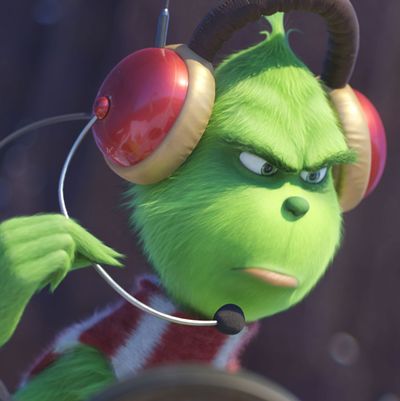
Movies and books love to tell us that mean, terrible characters can be changed and redeemed and made nice again, but that’s not always the case in real life, is it? If anything, the evidence seems to be that good people can easily turn awful. And I can’t help but feel that the story of Dr. Seuss’s How the Grinch Stole Christmas, were it to happen in the real world, would end with all the people of Whoville going paranoid and indulging in an orgy of retribution and hate after finding out that all their Christmas presents were gone. But the holidays are upon us, and the children need to be entertained, so there’s a new animated Grinch movie coming out, and we have to deal with it.
The good news is that within its own little cinematic fantasy realm, Scott Mosier and Yarrow Cheney’s The Grinch manages to be pleasantly moving in its treatment of Seuss’s classic solitary crank. As voiced by Benedict Cumberbatch, the Grinch is a surly, sour, but ultimately wounded soul. Seuss’s beloved original doesn’t really flesh this furry, green weirdo out all that much — “The Grinch hated Christmas! The whole Christmas season! Now, please don’t ask why. No one quite knows the reason” — aside from speculating that his heart was two sizes too small. So the script now provides further motivations for his hatred of Christmas. Whoville’s carols take the Grinch back to memories “of his earliest years, to that lost, lonely boy, who cried all of those tears,” and we learn that he was once a little wide-eyed orphan whose eagerness to receive presents and cards and visitors was matched only by his heartbreak and eventual bitterness when he got none.
That’s a fairly standard bit of character development for children’s fare — even Captain Hook, remember, was eventually reimagined as a mean old man without a mommy — and while this may all sound like a vulgarization of Seuss’s humble, evocative poetry, it’s touchingly handled here. The flashbacks are just brief enough so as not to be cloying, and the film’s gentle narration (spoken by Pharrell Williams) incorporates the new stuff into familiar, rhyming Seussian cadences.
That feels like a minor miracle, because the surreal simplicity of Seuss’s work hasn’t usually translated well to the screen. The Chuck Jones–Boris Karloff cartoon short of The Grinch from 1966 is wonderful, but subsequent film adaptations of this story and The Cat in the Hat and The Lorax have disappointed with their overbaked attempts to expand such stripped-down, straightforward tales. This new Grinch has to walk a fine line — keeping the original’s spirit and aesthetic intact while making it work for a modern multiplex audience. The emotions are there, and the computer-animated characters feel right — the Whos, those button-nosed potato people who inhabit the town of Whoville, are adorable, with our young heroine Cindy Lou Who (voiced by Cameron Seeley), the most endearing of them all.
To set up Cindy Lou’s confrontation with the Grinch (disguised as Santa Claus) on Christmas Eve, the film cleverly has her devising a plan to talk to St. Nick about a very special request: She doesn’t want a toy, or a pony, or anything like that, but rather an acknowledgement of how hard her overburdened mom (Rashida Jones) works. A simple letter won’t do, so Cindy Lou needs to look Santa in the eye. (In a nice bit of irony, it’s the Grinch himself who suggests that something more than a mere letter is required for this one.)
Less successful are the insistent roller-coaster-isms that now seem obligatory with so many animated wannabe blockbusters. It’s not enough for The Grinch to fill out Seuss’s spare world of craggy, snowy valleys, with Mount Crumpit overlooking the sleepy town of Whoville. Now, the camera operatically rockets past frozen lakes and up bright white slopes and over cliffs and waterfalls, following birds skiing on icy surfaces and then soaring over rolling hills. In Whoville, Cindy Lou sleds down snow-covered slopes with an inflatable ring. Everybody seems to be zooming or catapulting or sliding or flying somewhere. It’s as if the filmmakers, not entirely confident that their admirably modest tale will maintain our interest, want to impress us with effects work — a tactic that always seems pointless since these are animated films to begin with. It strikes an awkward note, but luckily, it’s a minor one. Mostly, The Grinch offers a touching opportunity to enjoy the increasingly rare sight of a wicked one seeing the error of his ways.


